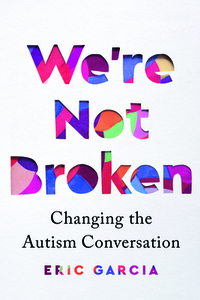Take a photo of a barcode or cover
challenging
informative
reflective
slow-paced
We're Not Broken took on a lot of topics that frequently are challenged with the autistic community. From politics to relationships to healthcare.
I found this book to be dry but informative. I'm walking away with a lot of knowledge from a plethora of autistic voices. Garcia does a good job maintaining the diverse stories of each autistic person. I was glad to read about other people's stories, but I'd hoped for more of it. More emotional connection. This is a slow read because it is so information heavy. Still glad to have read it.
I found this book to be dry but informative. I'm walking away with a lot of knowledge from a plethora of autistic voices. Garcia does a good job maintaining the diverse stories of each autistic person. I was glad to read about other people's stories, but I'd hoped for more of it. More emotional connection. This is a slow read because it is so information heavy. Still glad to have read it.
informative
reflective
fast-paced
informative
reflective
medium-paced
emotional
informative
reflective
fast-paced
I originally read this back in 2022 sometime after it came out in 2021 and wanted to re-read it now both to do a review for it and also because of the current political rhetoric around autism. I really like the way Eric Garcia took the time to explain why and how he wanted to write this book. There was a good variety of people represented in this book from across the spectrum of support needs as well as gender and race.
Garcia also makes a point of saying how people can have different needs but often assumptions are made about who needs what supports to be successful. He emphasizes that Autistic individuals who succeed don't "overcome" their autism but rather succeed because they are given the proper supports throughout their lives. There was a lot of discussion about being willing to seek out support along with the fear that needing support means one is not capable of being out in the world which can hinder actually getting support.
The book is divided into several categories including those for work, education, housing, gender, and race and in each one Garcia both tells his own experiences and also shares the experiences of others. Again, each section does a good job of showing a range of experiences. I particularly appreciated the first chapter which outlined a lot of the history of autism and how it has been viewed over the years. It's a bit weird reading this book now during the second Trump presidency when it was written during the first and some policy decisions were made at that time.
I also appreciated the gender and race sections of the book, which illustrated why there is seemingly such an increase in diagnosis over the years. Girls, non-binary, and trans individuals are often overlooked as many traits are assumed to be more about gender (like being shy) than anything else. Also, with regard to race, there was a point in time when it was assumed only white boys were autistic (mostly due to the way studies were conducted), while Black and Brown children were given different diagnoses, such as Oppositional Defiant Disorder.
Overall, I think Garcia does a great job highlighting the various issues that autistic people face and the ways that assumptions have been made across the spectrum with regard to ability and how best to support autistic people. There is some good discussion about the conflicts that can exist between parent advocates and self-advocates. Nearly always, parents want to do best by their children, but sometimes the idea of finding a cure can cause more harm than good. Often, the push for a cure comes at the expense of actually providing care and support to the children and adults that currently exist. And this is true for a lot of different disabilities where better supports would be appreciated more than finding a cure.
Garcia also makes a point of saying how people can have different needs but often assumptions are made about who needs what supports to be successful. He emphasizes that Autistic individuals who succeed don't "overcome" their autism but rather succeed because they are given the proper supports throughout their lives. There was a lot of discussion about being willing to seek out support along with the fear that needing support means one is not capable of being out in the world which can hinder actually getting support.
The book is divided into several categories including those for work, education, housing, gender, and race and in each one Garcia both tells his own experiences and also shares the experiences of others. Again, each section does a good job of showing a range of experiences. I particularly appreciated the first chapter which outlined a lot of the history of autism and how it has been viewed over the years. It's a bit weird reading this book now during the second Trump presidency when it was written during the first and some policy decisions were made at that time.
I also appreciated the gender and race sections of the book, which illustrated why there is seemingly such an increase in diagnosis over the years. Girls, non-binary, and trans individuals are often overlooked as many traits are assumed to be more about gender (like being shy) than anything else. Also, with regard to race, there was a point in time when it was assumed only white boys were autistic (mostly due to the way studies were conducted), while Black and Brown children were given different diagnoses, such as Oppositional Defiant Disorder.
Overall, I think Garcia does a great job highlighting the various issues that autistic people face and the ways that assumptions have been made across the spectrum with regard to ability and how best to support autistic people. There is some good discussion about the conflicts that can exist between parent advocates and self-advocates. Nearly always, parents want to do best by their children, but sometimes the idea of finding a cure can cause more harm than good. Often, the push for a cure comes at the expense of actually providing care and support to the children and adults that currently exist. And this is true for a lot of different disabilities where better supports would be appreciated more than finding a cure.
Nuanced and well credited. I think some “parent advocates” and folks who aren’t looking to have their ideas challenged skewed the star ratings.
I think it could have been harsher on the puzzle piece people.
I think it could have been harsher on the puzzle piece people.
informative
inspiring
sad
medium-paced
informative
inspiring
fast-paced
informative
fast-paced
This is a very clear and informative book on autism spectrum disorder. It goes a little into the history, a little into the story of some of those with autism, a little into what it is to live with autism, and a little into what it means to be part of a diverse community and have autism. It doesn't sugar-coat the reality, nor does it castigate the disability. Overall it is very well presented.
informative
inspiring
slow-paced






